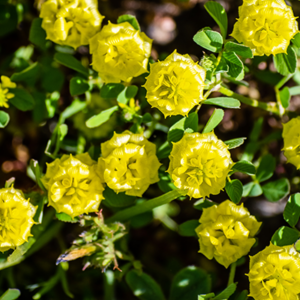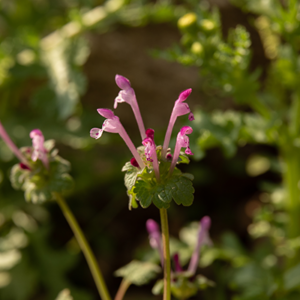One of the trade-offs of living in a sunny climate year-round is broadleaf weeds. Even in the midst of winter, weeds can crop up and ruin the look of our lawns. Here are five common Florida weeds to watch out for in late autumn and winter.
Common Florida Weeds Appearing In Winter
Lawn Burweed (Soliva sessilis)
Lawn burweed also goes by spurweed and stickerweed – and with good reason. Not only does this broadleaf weed ruin the appearance of lawns, but it also is painful and sticky if you happen to step on one barefoot or brush against one. This winter annual germinates in fall as temperatures cool. You may not even realize it’s in your lawn at first, as it prefers to stay small and inconspicuous during the winter. Look for weeds with spiny tips and burs along the leaf axis. Lawn burweed grows low to the ground and has parsley hairy leaves that are divided into narrow segments. Leaves are about 1/2 – 1.5″ long and about 1/4 – 1/2″ in width. Its overall diameter is about six inches, and it typically doesn’t grow taller than four inches at the most.
Hop Clover (Trifolium campestre)
Hop clover responds well to herbicide, so don’t fret if this particular weed makes an appearance. Lawn Master can easily wipe it out during our lawn maintenance routines. Hop clover is a winter annual with a “trifoliate leaf,” which you’d recognize as a similar shape to white clover. The leaves have prominent veins and short stems. In fact, the overall plant is short, hairy, and appears somewhat reddish. When it produces flowers, they are bright yellow and grow in clusters.
Chickweed (Stellaria media)
A member of the carnation family, chickweed is actually an edible wild plant. Interesting as that may be, you probably aren’t thrilled to see it on your lawn, nor are you excited about adding it to the dinner table. This cool-season annual will begin to germinate now, in the fall, and will produce large mats of foliage if left undisturbed. One of the taller weeds, it can reach up to 15 inches in height. Leaves are oval-shaped and have slender hairy stems. Flowers produced are small and white with five petals per bloom. Chickweed grows from a central point and branches out, creating a cluster. However, if you have quite a few chickweeds in the lawn, the clusters can coalesce, and you won’t be able to tell where each plant starts.
Henbit (Lamium amplexicaule)
Like the other weeds we’ve discussed, henbit is a winter annual. Notably, it has either green or purple-colored square systems. Leaves are oval in shape, resembling eggs, and the undersides have prominent veins. Its stems are hairy and, like chickweed, it can grow quite tall – about 16 inches in height – and has a strong fibrous root system, which makes digging out henbit by hand challenging. The flowers produced are red or purple in color, and henbit will continue to flower over the winter and into spring.
Annual Bluegrass (Poa annual)
Did you know that annual bluegrass is the most common grassy weed in the world? Like henbit and chickweed, it grows tall and fast. In as few as eight weeks, annual bluegrass can reach heights of 15 inches and begin to produce seeds. Seeds are viable only a few days after pollination, which allows the weed to grow and spread quickly – even in lawns mowed regularly. The blades of annual bluegrass are known for their rich green hues and short blunt tips. Stems appear slightly flattened and bent towards the base. Annual bluegrass is also fond of producing dormant seeds, which won’t appear until spring, leaving you with a false sense of security in late fall and winter. That’s why it’s so important to apply a pre-emergent weed control product in the fall. Even if the seeds haven’t had a chance to germinate yet, the substances will knock them out.
Tackle Weeds With Professional Lawn Care Near Pensacola
Don’t let annoying winter weeds ruin the look of your lawn. Trust the experts at Lawn Master! For 40 years, we’ve helped thousands of customers with weed control and other lawn care issues. Our lawn care program will treat all the broadleaf weeds that plague our lawns in the cooler season. And it keeps your lawn looking its greenest! If you’d like to learn more or schedule an appointment, give us a call at 850-476-1601, or you can contact us below!